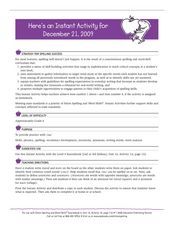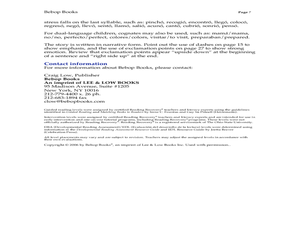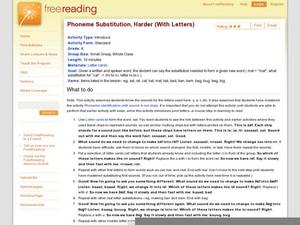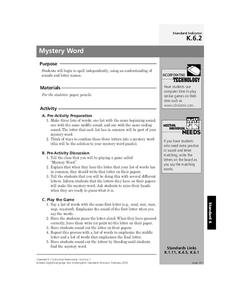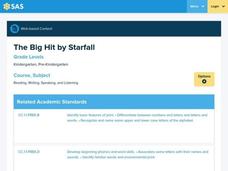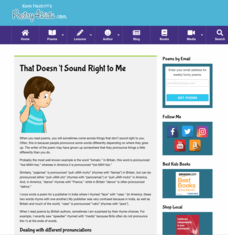ReadWriteThink
Word Recognition Strategies Using Nursery Rhymes
As a class, scholars read the poems, Humpty Dumpty, Peter, Peter, Pumpkin Eater, and Jack and Jill, in order to identify words with the same ending sound. Using their rhyming skills, learners brainstorm additional words from word...
Curated OER
Word Origins
Understanding a word's etymology can really help with decoding and building vocabulary skills. Readers compare and contrast words of similar origins but with different difficulty levels. They focus on prefixes, suffixes, and affixes....
Curated OER
Using the Sounds of Words Reading Task
Young readers demonstrate phonemic awareness in words and blends, and recognize 100 high-frequency words. Use a nursery rhyme to point out rhyming words, and change the words by putting a new letter at the beginning. Each learner will...
Kelly's Kindergarten
Kelly's Kindergarten: Words that End in T
From hat and hut to rat and cat, youngsters review consonant-vowel-consonant (CVC) words that end in the letter t. They first cut out and paste provided images, and then categorize them based on their end sound (i.e. /at/ /et/ /ot/ and...
Curated OER
Spelling with /ou/ Sound
Fourth graders recognize spelling words with ou and ow sounds. In this spelling activity, 4th graders begin with ground and town and build lists of words with similar spelling. Students complete a worksheet with antonyms and synonyms for...
Curated OER
Guided Reading with Elizabeti's Doll
Practice reading strategies using Elizabeti's Doll by Stephanie Stuve-Bodeen. Readers utilize decoding and comprehension strategies before, during, and after reading the story. A detailed list of text features, high frequency words,...
Road to Grammar
Confusing Words
You bathe in a bath, and you might advise someone by giving advice, but how do you tell the difference between these commonly misused words? This page provides 10 sets of words that sound or look similar, but have different meanings....
Kelly's Kindergarten
Kelly's Kindergarten: P Words
From paperclips to pencils and pigs, your young learners will have a party identifying words that begin with the letter P! They begin by cutting and pasting images of those words to a worksheet, and then practice writing capital and...
Curated OER
Phoneme Identification with Sound-it-Out Chips
Looking for a tangible way to help emerging readers identify phonemes? You've found it! They use chips without letters to segment single-syllable words into first, middle, and last sounds. As you say each sound, scholars place a chip on...
Curated OER
Commonly Misspelled Words
Display this list of commonly misspelled and frequently confused words for your learners. Though there is no interactive component, this handout is a great reference tool comparing many homophones such as sole and soul. One tip...
Curriculum Corner
Digraph Word Hunt
Support young learners with developing their spelling skills and ready fluency with this simple graphic organizer. Focusing on the four consonant digraphs /th/, /ch/, /sh/, and /wh/, students dig through their independent reading books...
Curated OER
Phoneme Substitution, Harder (With Letters)
Emergent readers create new words by changing a phoneme, using sets of letter cards to spell out each CVC word. They begin by substituting initial sounds, then final sounds, and lastly the middle vowel. Help them sound out each word,...
Curated OER
Chicken Soup With Rice
Complete a variety of activities related to the Maurice Sendak's book Chicken Soup With Rice. Readers identify the months of the year, identify words starting with the letter J, explore online illustrations created by Maurice Sendak, and...
Curated OER
Short Vowel Sounds
Some vowels make the same sound, like the vowels in grow and both. Read the words on the left hand side of the page (there are six) and match them to a similarly sounding word on the right hand side.
Meadows Center for Preventing Educational Risk, University of Texas at Austin
Lesson 6 - Vowel-Consonant-E Syllables
Adding an e sometimes significantly changes the pronunciation of a word. An informative lesson introduces Vowel-Consonant-E syllables by helping learners see the difference between the pronunciation of words like mop and mope. A script...
Curated OER
Initial Sounds with Word Families
In this word sound worksheet, students practice different word and letter sounds. They repeat rhymes, name letters, review letter sounds, review similar word sounds and complete an activity where they use a word bank to fill in the...
Curated OER
Mystery Word
Help spellers hear words that have the same beginning letter in them and guess the letter. Each speller has a piece of paper where they are to write down the letter once they have identified it. For instance, the teacher will say, "may,...
Curated OER
Troublesome Word Pairs
This activity helps to understand when to use commonly confused words. It includes definitions, writing exercises, and questions that require paraphrasing the meaning of sentences. A good exercise for middle schoolers, or review for high...
Curated OER
Easily Confused Words: Precede and Proceed
So many words are easily confused in the English language. Take precede and proceed, for example. Look at the example sentences provided here, and then have your learners take the short quiz. Have they mastered these vocabulary terms?
Curated OER
Commonly Confused Words - Quiz 16
These words are very confusing for non-native English speakers because they sound very similar, but they have different meanings. Quiz your English language learners on their knowledge of various homophones with this 20-question quiz.
Curated OER
The Big Hit
Learners are introduced to the phonetic sound associated with the short letter "i" and listen to a story which includes words with this sound. For this the big hit starfall lesson, students build sound letter accuracy. Learners also...
Curated OER
Phoneme Substitution (With Letters)
Get pre-readers comfortable with phoneme substitution using these helpful letter cards, which are printable in three different sizes depending on your classroom needs. Once scholars understand some letter sounds, they can begin...
Poetry4kids
That Doesn’t Sound Right to Me
Does pajamas rhyme with llamas to you? If it does (and even if it doesn't), an online lesson on rewording poetry for regional pronunciation may be helpful for you and your students.
K12 Reader
Choose the Correct Homophone
It's a known secret that English can be a difficult language to learn, and homophones don't make it any easier. Help your young readers tackle these tricky words with this simple fill-in-the blank exercise in which they identify the word...






